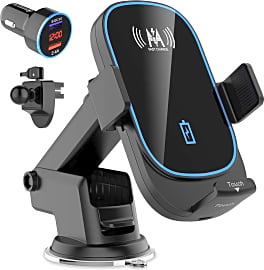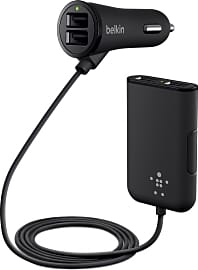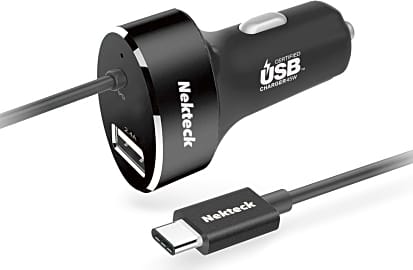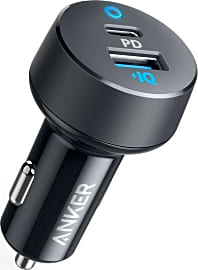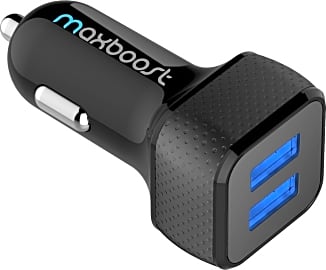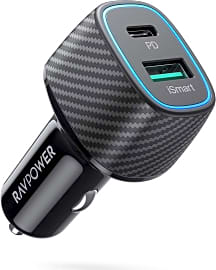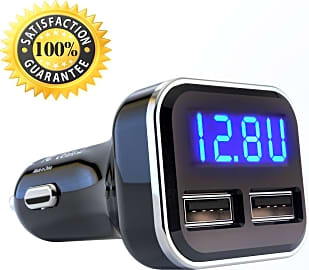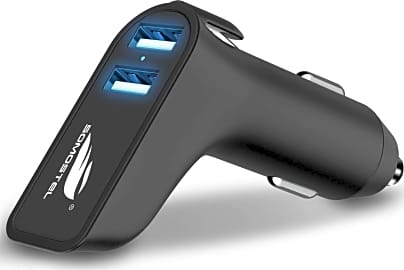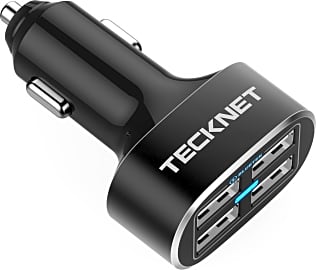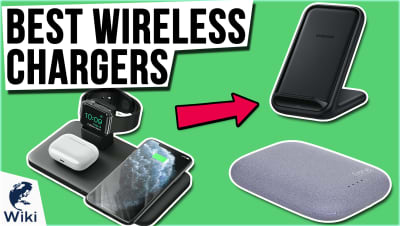The 10 Best USB Car Chargers

This wiki has been updated 41 times since it was first published in May of 2015. If you need power on the go for your mobile devices, check out our selection of USB car chargers. They're capable of keeping all of your family's electronics juiced up, including phones, GPS systems, MP3 players, and more, so you and your youngsters can stay entertained, informed, and in touch, no matter how long the journey. We've included options for both USB-A and USB-C connections. When users buy our independently chosen editorial choices, we may earn commissions to help fund the Wiki.
Editor's Notes
March 23, 2021:
Between coming across a number of interesting options that we were eager to include on our list, and needing to deal with a number of our old choices that no longer seemed to be around, it wound up being a fairly busy round of updates for us. The options we removed were the Scosche Powervolt 36W, Aukey CC-Y10 and ZMI PowerCruise C2.
Our first new pick, the Somostel Escape Tool, could make an interesting supplement to your roadside emergency kit, with its integrated seatbelt cutter and window hammer. Apart from those extras, in terms of its actual charging ability, it is quite feature bare, only offering a pair of USB-A ports, but it’s also an extremely affordable choice, and not bad looking, so overall it seemed ripe for this list. We did take notice of some safety issues mentioned in user reviews, but as they were all from 2019 or earlier, we judged that it's likely that the company resolved any problems.
Next we added the Qidoe HC61A, which is a hub-style offering similar to the Belkin Road Rockstar. They both feature four USB ports, and we liked the way the Rockstar included a couple on the plug-end of the device, but we still favored the HC61A because of its integrated voltmeter, five-year warranty and three, 12-volt DC outlets, which are each equipped with a designated power switch.
Our last new pick was the KKM QC3-2, which sets itself apart from much of the category with the inclusion of a handy wireless charging station. It comes with two mounting brackets, so you can decide whether you’d prefer it over top of your air-vent or dashboard, and also incorporates a small digital clock, as well as an extra 2.4-amp USB-A port.
If you’re looking for extra-automobile charging solutions, or maybe just a way to squeeze a few extra ports out of your existing car charger, then you might be interested in our list USB hubs.
January 06, 2020:
At this time, the iXCC Road Trip suffers from availability issues, and the Ailun Fast Charger simply cannot compete with some of the bigger names, so we have opted to remove them both. When it comes to the well-known names, we have updated our choices to include newer models, most of which now offer USB-C fast charging capabilities. For most users, the best choices include the Nekteck PD 45W and the Anker PowerDrive PD 2; these are both dual USB-A/USB-C models that provide excellent compatibility with a wide range of devices. Neither is particularly expensive, and they offer plain styling but plenty of functionality. If you need dual USB-C charging, then the Scosche Powervolt 36W is the way to go, although its boxy design doesn't earn it tons of style points. For those who need to charge four devices at once, there's the TeckNet PowerDash D2 or the Belkin Road Rockstar. They'll keep everything from cheap smartphones to tablets powered up on those long road trips with friends or family.
Special Honors
Mophie USB-C The Mophie USB-C is an 18-watt fast charge model that boasts a sleek, attractive design and a two-year warranty. It's a little more expensive than the competition, however, and only offers one port, which may or may not be an inconvenience. apple.com
Moshi QuikDuo You can count on the Moshi QuikDuo for the long haul thanks to a strong aluminum cover plate and excellent power management circuitry. A dual USB-A/USB-C model, it is exceedingly compact and made to blend in with your car's interior and not stick out like a sore thumb. moshi.com
Understanding USB Devices
Smartphone owners can plug their device into a friend’s computer, or any product that has a USB port.
Technology manufacturers understand that making device-specific chargers is unsustainable and their solution has been to create more USB-chargeable products. Thanks to USB connectors, people no longer have to carry chargers everywhere they go. Smartphone owners can plug their device into a friend’s computer, or any product that has a USB port.
Within the USB network, there is always a host and a device. If the user plugs a phone into a laptop, the laptop is the host and the phone is the device. The host always delivers power to the device, but data can flow in both directions. When a smartphone is plugged into a laptop, the phone can send photos to the computer, but the computer can also send data – like music or apps – to the phone. Whether or not information can be transferred depends on the port. A standard downstream port — the type found on most laptops — delivers power and allows for an exchange of data, but a dedicated charging port only allows for charging. An AC wall plug with a USB port is an example of the latter.
Some ports deliver power faster than others. Many people report that their smartphone charges much quicker when it’s plugged into a laptop, than when it is plugged into a wall charger. The difference in charging speeds is due to the fact that not all ports are created equal. In fact, there are three main USB port types commonly found in devices. USB 1.0 and 2.0 sockets have four pins that carry a 5-volt power supply. USB 3.0 sockets have an additional 5 pins, and can deliver nearly twice as much power. The emergence of the stronger USB 3.0 has caused some people to worry about overpowering their devices. Smartphone owners who received a USB 1.0 or 2.0 wall charger are concerned that by plugging their device into a 3.0 port, they will cause an over surge. But you can plug any USB device and any USB cable into any USB port, without an issue.
How A USB Car Charger Can Save The Day
USB car chargers have a USB port on one end and plug into a cigarette lighter on the other end. The standard American vehicle’s cigarette lighter can send out 12 volts of power, which is more than enough to rapidly charge any personal electronic device.
A USB car charger can be extremely useful when a person is stuck in traffic, late for an important call, and their phone dies.
Most individuals travel with several devices in their car at once, from smartphones to e-readers. It’s common to rely on a GPS app — such as Waze or Tom Tom — to receive proper driving directions and as such, one can be completely lost if their cell phone dies. Stopping at a business and asking for directions is not an option when on a remote road. Having the option to charge a phone through a car could save you from a dire situation.
A USB car charger can be extremely useful when a person is stuck in traffic, late for an important call, and their phone dies. There’s also the possibility of being the passenger on a long car trip with no way to pass the time. By plugging an e-reader into a car charger, one can have instant entertainment. Photographers who need to capture images while traveling can’t afford to have a dead camera on a road trip. Most digital cameras are USB compatible, so photographers can use their vehicle’s power to keep their camera on at all times.
How To Choose A Charger
A car battery can deliver more than enough power to charge several devices at once; it is one of the strongest USB hosts one can find. To make use of this unique resource, buy a charger with multiple USB ports and you could conceivably charge a smartphone, e-reader and camera all at once, and at a rapid speed.
If broken or unresponsive chargers have been a problem, one might appreciate a car charger with an LED light.
If broken or unresponsive chargers have been a problem, one might appreciate a car charger with an LED light. The light confirms that charging is occurring. Trying to charge and use a device from the backseat is nearly impossible without a charger that includes a long USB cord. If the user can’t sit in the front seat for every ride, but wants access to a power source for their device, a cord that extends a minimum of 3-feet must be chosen.
Some car chargers tell the driver information about the car, like the charge in its battery, or the ambient temperature inside, which can be useful. People with children may appreciate a car charger with a protective cap — this will prevent damage if somebody spills a beverage in the car. It will also stop curious toddlers from putting their fingers inside the socket. If one’s car has an all-black interior, they should avoid the standard black chargers and buy a brightly colored one that is easily spotted between the seats.


